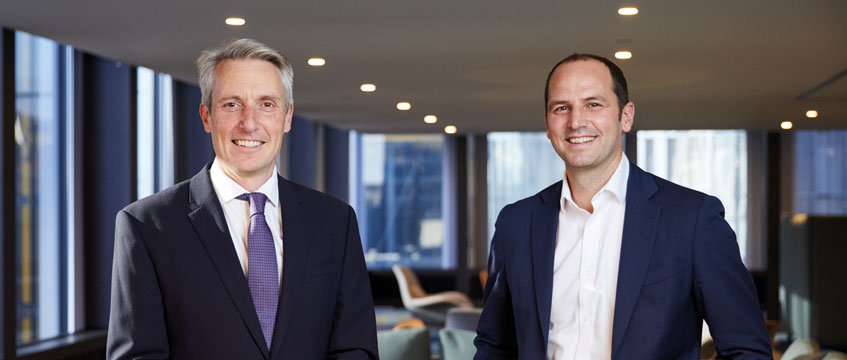Almost by definition, corporate restructuring and revamps bring with them introspection. But the goal is that once that reflection is complete, it is time to end the navel gazing.
As Ben Sanderson nears the end of his first year as managing director for real estate at Aviva Investors, the asset management arm of the insurance giant, he says he is hopeful a foundation has been laid that will let the business flourish in difficult times.
Aviva Investors’ real assets business has assets under management of £47bn, about £27bn of which is in real estate equity, debt and long-income. The challenge for Sanderson and the team has been how to create an investment platform that is fit for purpose and even – given its scale – fleet of foot.
Sanderson joined Aviva Investors in January to oversee its direct real estate investment, reporting to Daniel McHugh, chief investment officer for real assets and Sanderson’s predecessor. He brought with him more than two decades of experience in the UK and European markets, most recently from 13 years at Federated Hermes and earlier from roles at M&G Real Estate. When he arrived, James Stevens, who had led the real estate division on an interim basis since early 2021, took on a new role as head of real estate investment, reporting to Sanderson.
I meet Sanderson and Stevens less than a week after then-chancellor Kwasi Kwarteng’s so-called “mini-Budget”, which sent markets into turmoil. The economy had already looked to be in a perilous state. Now things were looking even worse. For an organisation such as Aviva Investors, and in particular its real assets and real estate arm, where is the opportunity in such a time?
“The first opportunity and the key requirement is to have liquidity at this point in the market,” Sanderson says. “If you have a strong business with a strong footing and some smart people, [they need to have] the liquidity to be able to get into the market. At all these points in my career, I have seen smart people who have seen some opportunities but then couldn’t corral the capital to do the thing they felt they could do.”
He adds: “We have that liquidity. Because of decisions we made in the past, we’re in a stronger position from a liquidity point of view and a capital point of view than we ever have been. We’re looking out, not in.
“There are great opportunities for equity investors who can move quickly, like we’re going to do.”
The world has changed
The business is a different beast to that of just a few years ago. “We have restructured the real estate business, restructured our capital lines, brought the real assets business together – real estate debt, real estate equity, infrastructure debt and equity, structured finance – which I think is hugely advantageous at a time like this,” Sanderson says. “And prior to my arrival, the relationship with the group had been clarified: what is the role of in-house investment manager?”
He says: “My mandate was to look at that plan, tweak as I saw fit, but implement that plan and grow. That’s what we are trying to do, clearly in challenging times. We have had a good year from the point of view of the real assets and real estate business. The medium term challenge is to keep growing.”
One change has been to refocus on active management within the real estate equity business.
“The world has changed,” Sanderson says. “That world of balanced funds and index tracking and benchmarks, that’s not really what clients want. Clients want alpha generation. They want an active management style. They want accountability from their managers. That’s a big part of what we are trying to do, to get clarity on investment processes and investment decision making and clarity on that kind of alpha [generation].”
That active management approach is what lies behind a variety of Aviva Investors-backed projects, including its partnership with Allianz Real Estate to redevelop 1 Liverpool Street, EC2, and 101 Moorgate, EC2 into new office and retail schemes that bookend Liverpool Street’s Elizabeth Line station; and a retrofit of the Curtain House office block in Shoreditch, EC2; and the 1m sq ft Manchester media hub at Enterprise City with Allied London.
Sanderson points to the latter as “one of the most significant additions to that city since the industrial revolution”. He adds: “That space has been out of sight. And next year, when it’s complete, it will be open to the public.”
Pick and choose
Stevens points to a “simplification and focus” in how the real estate division operates today. It has gone from 1,000 assets to a smaller, higher quality portfolio of around 300, and some 28 different funds and strategies five years ago to three or four now. “Fewer assets, fewer funds, more focus,” Stevens says.
“You can’t be the best at everything, everywhere. You can’t be the best passive index fund manager as well as the best manager of Nordic logistics, as well as the best developer of residential in Ireland,” he adds. “So we focused the fund suite through last year.”
Last year’s decision to close the gated Aviva Investors UK Property Fund and its feeder funds came in a tumultuous, years-long period of pain for open-ended real estate funds, which saw redemptions rocket at a rate fund managers could not match with asset sales.
At the time, Aviva Investors said a review had suggested that the funds’ “ability to fully benefit from the economies of scale and the diversification of investments that collective investment schemes normally bring would soon be limited”. Now, Sanderson describes the choice to close the funds as “challenging” but also “a really prescient and far-sighted decision”.
“That’s about simplification, acknowledging that there are products and capital lines in the business that are scalable and work for investors and there are products and capital lines that don’t,” he says.
“Those products had a terrible global financial crisis, a terrible Brexit referendum and a terrible Covid and weren’t fit for purpose and weren’t of scale. That is a hard thing to do because those are profitable business lines at the time you close them down. But the reality is they are not long-term profitable. The structures don’t work.”
Their closure, he hopes, is another example of a decision that means he and colleagues can focus on opportunity rather than firefighting. Several investment houses have recently changed the redemption process for certain funds as new economic worries mount.
“All our peers who have those sort of structures, they are facing liquidity challenges,” Sanderson says. “They are looking inward at their client base and liquidity challenges rather than looking outward for the market opportunity.
“These are the points where good investment decisions deliver long-term performance. But you have to be patient about when those opportunities arise. If you are looking outward at it and you haven’t got liquidity challenges and your clients are happy, you can make those decisions. If you are a forced seller into this market, that’s not a good place to be.”
No sleepwalking
The focus for deals now will be “structural themes at cyclical pricing”, Stevens says. He and Sanderson believe opportunities will come in a relatively resilient residential market – “Structurally it will be a much greater component of our investment universe going forward,” Stevens says – but also in a repriced central London office market and UK logistics space.
The company sold out of some logistics assets as the market strengthened, Stevens says, but “that market is going to come back to us”.
Sanderson wants Aviva Investors to become one of the top five real assets businesses in Europe in the next three years. But he shies from giving a target for assets under management. “More important is delivering the margins and growing in profitable areas,” he says.
Not that caution is unusual as 2022 draws to a close. After all, if the past year has had its challenges in the markets, 2023 looks set to bring with it another set of trials.
“We don’t want to be sleepwalking through what is coming around the corner at us,” Sanderson says. “At the start of the year when the Ukraine war started and then energy prices were going up, it was clear that there was going to be some distress in the market. And so we will be more dynamic and, frankly, a little more assertive in our investment screening.”
More assertive, yes, but still looking outwards – those tough decisions were not for nothing.
To send feedback, e-mail tim.burke@eg.co.uk or tweet @_tim_burke or @EGPropertyNews











